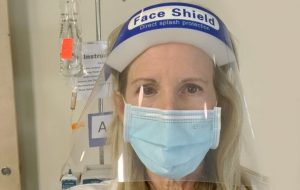N.J. desperately needs more nurses. To get them, we must invest in nursing education.
 I chose to study nursing back in 1978 because I realized how much I enjoy helping people from all walks of life become the healthiest version of themselves. Unfortunately, that choice is not available for some students because of financial and academic barriers, as well as capacity limitations in nursing programs around the country. In New Jersey alone, over half of the associate degree programs were forced to reject qualified applicants because of a lack of clinical sites and limited classroom space.
I chose to study nursing back in 1978 because I realized how much I enjoy helping people from all walks of life become the healthiest version of themselves. Unfortunately, that choice is not available for some students because of financial and academic barriers, as well as capacity limitations in nursing programs around the country. In New Jersey alone, over half of the associate degree programs were forced to reject qualified applicants because of a lack of clinical sites and limited classroom space.
For the past 20 years, I have been fortunate to call myself a nurse educator, teaching student nurses at the bedside, sharing my knowledge and experience in the classroom, mentoring faculty, leading curriculum revisions, and learning to grow as a leader during the pandemic. Nurse educators are critical in preparing the next generation of nurses. With the current workforce already feeling overwhelmed by a shortage, and registered nurse vacancies in New Jersey increasing 64% in 2021, it’s more important than ever to support and uplift the voices of nurse educators.
Nurse educators are brave. We face many obstacles in healthcare and higher education, including being overworked and underpaid. Yet nurse educators continue to work tirelessly to problem-solve issues while ensuring students receive high-quality learning experiences.
Nurse educators are resilient. We are bright and intuitive. In response to the challenges of the pandemic, nurse educators quickly adapted and ensured students continued to receive quality clinical training while facilitating the development of critical thinking, clinical reasoning and sound judgment through online learning. With more investment in nurse education, we can help prevent burnout so they can continue to thrive.
Nurse educators are innovative. We continue to learn and strive to create sound alternative learning experiences for the classroom, lab, and clinical settings while adapting to the rapidly and perpetually changing health care arena. Nurse educators are working with evidence-based education technology and pursuing best practices as we prepare our students for the Next Generation NCLEX licensing exam and their future careers.
Nurse educators are role models for students. Many students share how they did not know what it meant to be a nurse until they began their nursing studies. We model professional behaviors and develop students’ future professional identities while ensuring they’re equipped to manage the dynamic, complex needs of patients. Educators’ compassion is critical to fostering future generations of nurses.
During this unprecedented time in nursing education, many faculty are stressed and overwhelmed. Some are retiring or leaving the profession early due to burnout — in fact, nearly one-third of current faculty nationwide are expected to retire by 2025 — a trend that is fueled by a lack of clinical sites, often inadequate resources, and time pressures.
Nurse faculty shortages are a threat to the nursing pipeline. Nearly 92,000 qualified applications were turned away from baccalaureate and graduate nursing programs across the country in 2021 due to factors like limited faculty. Here in New Jersey, 8% of full-time registered nurse faculty positions and 13% of full-time licensed practical nurse faculty positions were vacant in 2020, making it harder to educate more students. Unfortunately, these challenges have only been exacerbated by the pandemic. But we are on the brink of an opportunity to positively influence our profession by reimagining and transforming nursing education.
We must attract, admit, and retain more nursing students by making nursing a more accessible career path. We must expand program capacity by increasing clinical training opportunities and partnerships, investing in innovative education resources, and encouraging and incentivizing more nurses to become faculty. And we must ensure students are prepared for nursing school and the workforce by helping them gain acceptance to nursing school, pass licensure exams, and apply their skills. By investing in nursing education, we can ensure a more robust and sustainable workforce that will combat New Jersey’s limited supply of nurses and continue to help people through quality nursing care.
I’m hopeful for the future of nursing education. But nurse educators can’t do it alone. With support for nursing education from policy leaders and stakeholders, we can ensure a vibrant profession for years to come — one that will continue to positively impact students, patients, providers, and the entire health care system.
-Bonnie Ross, EdD RN CNE, is a former nurse educator from Rumson and currently serves as an ATI Nursing Education Consultant.
(This story originally appeared in NJ.com.)




